Many things have changed in football. It is a sport that has, in some ways, grown up a little. Equally, some things remain the same and within dressing rooms the pulls and torments of peer pressure endure.
‘The senior pros still rule,’ a source told me this week. ‘They set the tone. The way a squad of players behave when they are not actually on the football field largely depends on what they decide.’
The relevance of this observation today is simple and is to do with gambling. Ivan Toney of Brentford is doubtless regretting the fact he ignored clear rules that forbid players from placing bets on football.
Toney ignored that edict 232 times and will not play for eight months. But this is not the type of gambling that concerns many who hold footballers’ interests close to their hearts. People such as football welfare officers, agents and families.
No, what they worry about is the casual, in-house gambling that continues to take place on team buses, in hotels and training ground canteens, and on aeroplanes.

Brentford striker Ivan Toney is doubtless now regretting the fact he placed 232 bets on football
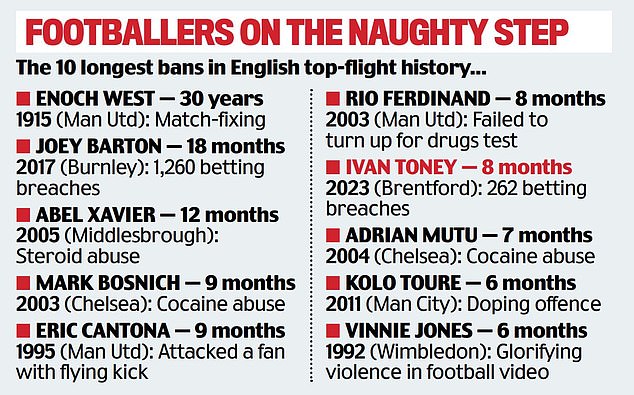
England international Toney has now been banned for eight months because of his betting
‘This is the real issue,’ explained one prominent agent. ‘We are talking about sums of money that are big relative to what players earn. Organised poker schools, casual bets. It happens everywhere and it’s really dangerous for young players, in particular, as they are being pressured by senior pros.
‘This means they end up involved in situations they can’t afford. Given all the fuss about the Toney situation, why are clubs turning a blind eye to this? It’s much more dangerous.’
On the website of the Professional Players’ Association, the guidelines are clear: ‘You are not allowed to place ANY bet on ANY football, ANYWHERE.’ For all the sympathy expressed in many quarters over the last week, Toney cannot claim that he did not know. All footballers know.
But that is about protecting the integrity of the game, to ensure players are not placing bets on the back of inside information. Football’s bigger gambling picture is one that places the players at risk, not the sport.
The academy system educates our young players on the dangers. They do their bit. But the reality of a life in football would surprise many who cling to a misguided belief that the world has turned full circle for the better.
The language remains choice, particularly when it comes to women, and the pressures to conform and fit in remain as daunting as ever.
At the Sporting Chance Clinic, established by former Arsenal captain Tony Adams almost 25 years ago, gambling, rather than alcohol abuse or drug addiction, is now recognised as professional sport’s biggest lifestyle problem.
Sitting down with Adams three years ago, he told me: ‘Gambling in the Premier League is now a bit of an epidemic. Ideally I would get the advertising out of the game because it does influence people. They spend fortunes on the ads for a reason. It’s because it works. It normalises it and that’s the issue I have got.’
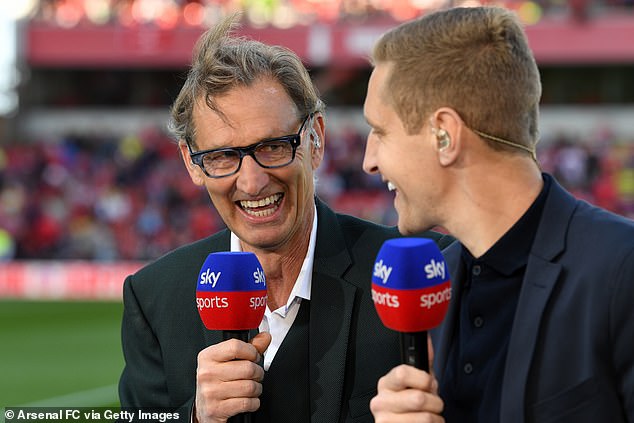
Tony Adams (left) called gambling in football an ‘epidemic’ and called for no betting adverts
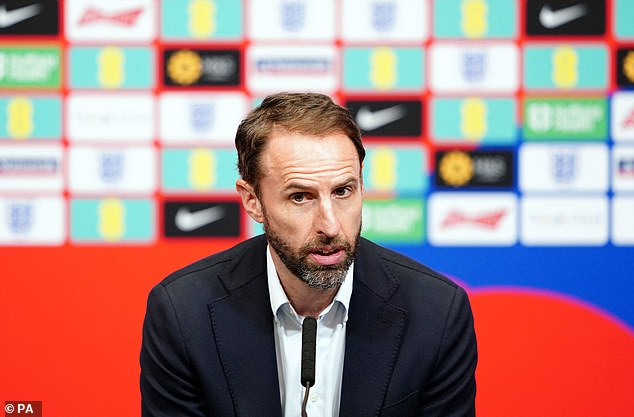
England manager Gareth Southgate says ‘we have got to look after people’ – and he is so right
Adams touches on a point regularly raised and football does appear to have a less than functional relationship with the betting industry.
Equally, it is hard to make a clear connection between a Ladbrokes ad on a hoarding at a Premier League stadium and a poker school on a team bus for an away game where the minimum stake is £10,000.
The monitoring of something such as that has to come from within a football club and the desire to do that has to come from within, too. Do we simply allow boys to be boys and girls to be girls? Or do our football clubs have a duty of care to protect young people from themselves? It is a pertinent question.
One player welfare officer, who worked at a Premier League club, told me: ‘It used to be alcohol. Now it’s social media and gambling. Casinos, online betting and the card schools at training.
‘I had one player who consistently denied he had a gambling problem but when I took his car in for a service there were casino chips scattered across the passenger seat.’
Meanwhile, at a big Premier League club one player sends a fixer to the bookmaker to place bets in cash in order to avoid an electronic financial trail. ‘When the guy comes back the betting slip is literally longer than his arm,’ another source revealed.
The casinos and bookies can see the footballers coming. They throw the doors open. Private rooms. Extensive tabs. That is their business. Our football clubs? Maybe they have a greater responsibility to develop and nurture those they pay so much to.
Speaking about Toney’s eight months in the wilderness this week, England manager Gareth Southgate said: ‘We have got to look after people.’ Few people care for or understand footballers better than Southgate but on this issue maybe he is more right than he thinks.
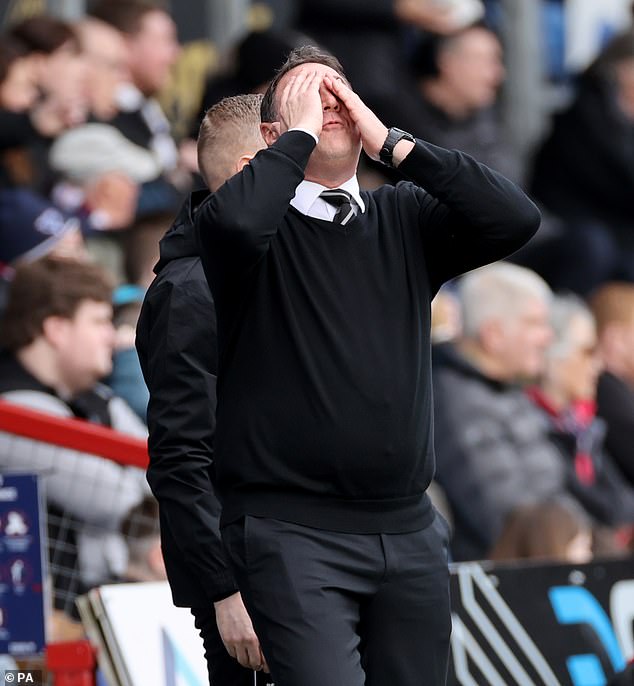
Ross County, led by Malky Mackay, are at risk of relegation from the Scottish Premiership
Ups and downs are all part of the beautiful game
Ross County must be the only football club in Britain where the stadium caters for more people (6,541) than actually live in the town (approx 5,500).
But if Malky Mackay’s team do not win at Kilmarnock on Sunday, they will be in a relegation play-off from the Scottish Premiership and some folk in the highland town of Dingwall will doubtless blame the manager.
This is the way that football works. Even where there is no blame, there is always blame. Clubs who go down have always done something wrong even though on occasion they haven’t. And this is the thing about relegation. It has to happen to somebody. If it didn’t we would become America and nobody wants that.
So at places like Leicester in the Premier League, answers are being sought. Did they sign the right players? Should they have sacked Brendan Rodgers sooner? Should they have sacked him at all? Was Dean Smith the right man to try to save them?
Tick yes if they stay up and tick no if they go down. There is even a theory among some Leicester fans that the new training ground is too comfortable. That’s a new one. Are the balls too round too? The goals too small? The leather on the seats of the team bus too smooth?
What about the fact that wheels just turn, Leicester are a medium-sized football club and those of that nature inevitably get sucked into a scrap at the wrong end from time to time.
Sure, Leicester won the league in 2016 but that was a miracle. They won the FA Cup in 2021 but Wigan did that in 2013 and were relegated the same month. There are only a handful of teams in the top division immune to relegation and Leicester are not one of them.
Rather than wring our hands over what may become of them this weekend, we should be thankful for what it was they gave us. As, for a while, it was quite wonderful.

Leicester could be demoted too – but ups and downs are all natural parts of the beautiful game
A recent chat in the Tottenham executive suites found the great and good discussing the best they had ever played against.
Ossie Ardiles came up against a few for club and country but the little Argentinean was unequivocal.
‘Bryan Robson,’ Ardiles said. They say we don’t appreciate our own quite enough and maybe they are right.
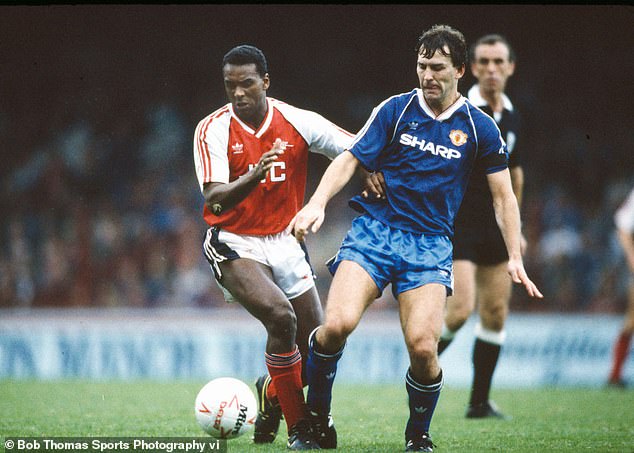
Ossie Ardiles said Bryan Robson is the best he’s ever played against; we should rate him higher
I got to know Chris Sutton a little during the World Cup in Qatar. He is quicker with a quip or a retort than he ever was over 10 yards. But sometimes even the sharpest brains can fade to blank.
Last Sunday’s 606 phone-in on Radio 5 Live was going smoothly until Sutton and Robbie Savage ended their chat with Brian, a publican and Brighton fan.
‘If Robbie and I drop in later is there a Sunday lunch available?’ enquired Sutton.
‘Well we have strippers on a Sunday…’ replied Brian.
For a moment the radio silence was quite golden.

Chris Sutton (above) was reduced to sudden silence on Radio 5 Live and it was quite golden
